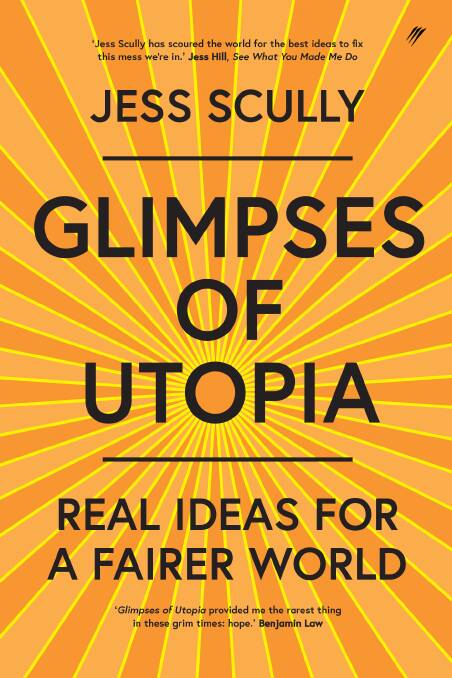- Glimpses of Utopia, by Jess Scully. Pantera, $26.95.
Utopia is over-rated. We would be going well if we made a bit of incremental progress now and again, rather than pursuing the illusion of an ideal society.
Subscribe now for unlimited access.
or signup to continue reading
Moreover, historical versions of utopia have been grim, drab, even dystopian.
Thomas More's, for instance (from 1516), included slavery, internal passports and communal meals; the place would have resembled a cross between a cloister and a Soviet gulag.
Jess Scully, deputy mayor of Sydney, has adopted a different approach, one of drift-net fishing where she has trawled for glimpses of utopia around the world.
A reader is obliged to wait until the last chapter, "What Now?", before Scully draws together prescriptions for social change.
A few might seem banal, some others esoteric. "Daylight the invisible" is an example of the latter, although its meaning for Jessup is pragmatic and reasonable.
She has in mind thinking about those who do not have a voice at the table.
As a general proposition, Scully's recommendations comprise thoughtful common sense.
Scully's worries include a familiar litany of modern woes: climate change; disruptive technology; increased inequality; greater polarisation; and institutions under strain.

Those are obvious problems, but still obviously important ones.
Scully appeals to "our most human instinct: the drive to care for each other and our planet".
For her, that drive seems to connote rather more than a logical focus on preserving and protecting ourselves and our homes.
I wonder, though, if she over-estimates us.
Glimpses of Utopia bristles and bustles with ideas. Scully recognises that "all the chips are stacked against change", but marshals her arguments for reform thoroughly and cogently.
The sources of her proposals are refreshingly eclectic, ranging from The Best Party in Reykjavik municipality to Audrey Tang campaigning for open government in Taiwan.
Sanna Marin, Prime Minister of Finland, is juxtaposed with Domiz, a "refucity" in Iraq.
This diversity in models and examples is a fair marker of Scully's curiosity, commitment, and combativeness.
If the book occasionally reads like an inspirational talk, that too its fitting for an author who pioneered a festival where innovation and iconoclasm have been prized (Vivid Ideas).
Scully characterises herself as "one of the last to benefit from the golden days of Australia's social welfare state".
She is a tribute to that system, especially in her keen appetite for a better, more just green future.

